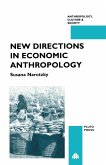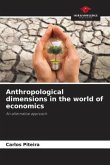Niccolo Leo Caldararo
The Anthropology of Complex Economic Systems
Inequality, Stability, and Cycles of Crisis
Niccolo Leo Caldararo
The Anthropology of Complex Economic Systems
Inequality, Stability, and Cycles of Crisis
- Gebundenes Buch
- Merkliste
- Auf die Merkliste
- Bewerten Bewerten
- Teilen
- Produkt teilen
- Produkterinnerung
- Produkterinnerung
By bringing together economic anthropology, ecology, and culture history, The Anthropology of Complex Economic Systems not only proposes a new model of human social evolution, but equally importantly creates a methodology for speaking to, and against, our present economic and environmental situation.
Andere Kunden interessierten sich auch für
![The Anthropology of Complex Economic Systems The Anthropology of Complex Economic Systems]() Niccolo Leo CaldararoThe Anthropology of Complex Economic Systems74,99 €
Niccolo Leo CaldararoThe Anthropology of Complex Economic Systems74,99 €![Economic Life of Mexican Beach Vendors Economic Life of Mexican Beach Vendors]() Tamar Diana WilsonEconomic Life of Mexican Beach Vendors135,99 €
Tamar Diana WilsonEconomic Life of Mexican Beach Vendors135,99 €![New Directions In Economic Anthropology New Directions In Economic Anthropology]() Susana NarotzkyNew Directions In Economic Anthropology43,99 €
Susana NarotzkyNew Directions In Economic Anthropology43,99 €![Anthropological dimensions in the world of economics Anthropological dimensions in the world of economics]() Carlos PiteiraAnthropological dimensions in the world of economics52,99 €
Carlos PiteiraAnthropological dimensions in the world of economics52,99 €![Post-Mortem Existence Within the Complex Systems Self-Organization Theory Framework and in Traditional Cultures Post-Mortem Existence Within the Complex Systems Self-Organization Theory Framework and in Traditional Cultures]() Yury N. KovalyovPost-Mortem Existence Within the Complex Systems Self-Organization Theory Framework and in Traditional Cultures189,99 €
Yury N. KovalyovPost-Mortem Existence Within the Complex Systems Self-Organization Theory Framework and in Traditional Cultures189,99 €![History, Time, and Economic Crisis in Central Greece History, Time, and Economic Crisis in Central Greece]() Daniel KnightHistory, Time, and Economic Crisis in Central Greece39,99 €
Daniel KnightHistory, Time, and Economic Crisis in Central Greece39,99 €![Economics and Morality Economics and Morality]() Economics and Morality70,99 €
Economics and Morality70,99 €-
-
-
By bringing together economic anthropology, ecology, and culture history, The Anthropology of Complex Economic Systems not only proposes a new model of human social evolution, but equally importantly creates a methodology for speaking to, and against, our present economic and environmental situation.
Hinweis: Dieser Artikel kann nur an eine deutsche Lieferadresse ausgeliefert werden.
Hinweis: Dieser Artikel kann nur an eine deutsche Lieferadresse ausgeliefert werden.
Produktdetails
- Produktdetails
- Verlag: Lexington Books
- Seitenzahl: 340
- Erscheinungstermin: 14. November 2013
- Englisch
- Abmessung: 235mm x 157mm x 25mm
- Gewicht: 703g
- ISBN-13: 9780739169711
- ISBN-10: 0739169718
- Artikelnr.: 39339215
- Herstellerkennzeichnung
- Libri GmbH
- Europaallee 1
- 36244 Bad Hersfeld
- gpsr@libri.de
- Verlag: Lexington Books
- Seitenzahl: 340
- Erscheinungstermin: 14. November 2013
- Englisch
- Abmessung: 235mm x 157mm x 25mm
- Gewicht: 703g
- ISBN-13: 9780739169711
- ISBN-10: 0739169718
- Artikelnr.: 39339215
- Herstellerkennzeichnung
- Libri GmbH
- Europaallee 1
- 36244 Bad Hersfeld
- gpsr@libri.de
Niccolo Leo Caldararo, PhD, is a lecturer at San Francisco State University. He is also the owner, director, and founder of Conservation Art Service.
Preface Acknowledgments Introduction Part I: Anthropology and Economics: A
Review Chapter 1: Anthropology and the Cosmology of Modern Economics
Chapter 2: Wants, Needs, and the Question of Surplus versus Wealth Chapter
3: Complexity and Stability or Stagnation: Declining Returns and the
Business Cycle Chapter 4: Wealth, Consumption, Quality of Life & Standard
of Living Part II: Introduction to Hominid Economics Chapter 6:
Introduction Chapter 7: Forest Fires, Origins, and Myths Chapter 8:
Traditional Peoples and Fire Chapter 9: Climate and Fire, Assessing Time's
Arrow and the Antiquity of Anthropogenic Fire Chapter 10: Forest Management
in Modern and Traditional Society Chapter 11: The Degraded Environment and
Homo Sapiens Chapter 12: Co-evolutionary Processes & Environmental
Exploitation Chapter 13: Makeup and Nature of Forests: Fire-adapted Species
vs 'Old Growth' Chapter 14: Determining Fire History: Fire Scars, Fire
Histories, and Thermal Alteration Chapter 15: Insects, Biomass Reduction,
and Pesticides Chapter 16: Conclusion: Forests and the Future Man Part III:
Cycles of Growth & Collapse versus the Possibility of Sustainable Societies
Chapter 17: Introduction Chapter 18: The Problem of Population & the Nature
of Human Society Chapter 19: Consumerism and Sustainability: Japan as an
Example Chapter 20: The Evolution of Modern Japan and its Transformation
Part IV: The Role of Ideology and Religious Precepts in the Containment and
Change of Society: A Modernist View Chapter 21: The Credit Crisis of 2008
to 201? Chapter 22: Ideology and Religious Precepts and Motivations: Why
People Work Chapter 23: Fundamentalism versus Globalism Part V: Conclusion
Bibliography Index About the Author
Review Chapter 1: Anthropology and the Cosmology of Modern Economics
Chapter 2: Wants, Needs, and the Question of Surplus versus Wealth Chapter
3: Complexity and Stability or Stagnation: Declining Returns and the
Business Cycle Chapter 4: Wealth, Consumption, Quality of Life & Standard
of Living Part II: Introduction to Hominid Economics Chapter 6:
Introduction Chapter 7: Forest Fires, Origins, and Myths Chapter 8:
Traditional Peoples and Fire Chapter 9: Climate and Fire, Assessing Time's
Arrow and the Antiquity of Anthropogenic Fire Chapter 10: Forest Management
in Modern and Traditional Society Chapter 11: The Degraded Environment and
Homo Sapiens Chapter 12: Co-evolutionary Processes & Environmental
Exploitation Chapter 13: Makeup and Nature of Forests: Fire-adapted Species
vs 'Old Growth' Chapter 14: Determining Fire History: Fire Scars, Fire
Histories, and Thermal Alteration Chapter 15: Insects, Biomass Reduction,
and Pesticides Chapter 16: Conclusion: Forests and the Future Man Part III:
Cycles of Growth & Collapse versus the Possibility of Sustainable Societies
Chapter 17: Introduction Chapter 18: The Problem of Population & the Nature
of Human Society Chapter 19: Consumerism and Sustainability: Japan as an
Example Chapter 20: The Evolution of Modern Japan and its Transformation
Part IV: The Role of Ideology and Religious Precepts in the Containment and
Change of Society: A Modernist View Chapter 21: The Credit Crisis of 2008
to 201? Chapter 22: Ideology and Religious Precepts and Motivations: Why
People Work Chapter 23: Fundamentalism versus Globalism Part V: Conclusion
Bibliography Index About the Author
Preface Acknowledgments Introduction Part I: Anthropology and Economics: A
Review Chapter 1: Anthropology and the Cosmology of Modern Economics
Chapter 2: Wants, Needs, and the Question of Surplus versus Wealth Chapter
3: Complexity and Stability or Stagnation: Declining Returns and the
Business Cycle Chapter 4: Wealth, Consumption, Quality of Life & Standard
of Living Part II: Introduction to Hominid Economics Chapter 6:
Introduction Chapter 7: Forest Fires, Origins, and Myths Chapter 8:
Traditional Peoples and Fire Chapter 9: Climate and Fire, Assessing Time's
Arrow and the Antiquity of Anthropogenic Fire Chapter 10: Forest Management
in Modern and Traditional Society Chapter 11: The Degraded Environment and
Homo Sapiens Chapter 12: Co-evolutionary Processes & Environmental
Exploitation Chapter 13: Makeup and Nature of Forests: Fire-adapted Species
vs 'Old Growth' Chapter 14: Determining Fire History: Fire Scars, Fire
Histories, and Thermal Alteration Chapter 15: Insects, Biomass Reduction,
and Pesticides Chapter 16: Conclusion: Forests and the Future Man Part III:
Cycles of Growth & Collapse versus the Possibility of Sustainable Societies
Chapter 17: Introduction Chapter 18: The Problem of Population & the Nature
of Human Society Chapter 19: Consumerism and Sustainability: Japan as an
Example Chapter 20: The Evolution of Modern Japan and its Transformation
Part IV: The Role of Ideology and Religious Precepts in the Containment and
Change of Society: A Modernist View Chapter 21: The Credit Crisis of 2008
to 201? Chapter 22: Ideology and Religious Precepts and Motivations: Why
People Work Chapter 23: Fundamentalism versus Globalism Part V: Conclusion
Bibliography Index About the Author
Review Chapter 1: Anthropology and the Cosmology of Modern Economics
Chapter 2: Wants, Needs, and the Question of Surplus versus Wealth Chapter
3: Complexity and Stability or Stagnation: Declining Returns and the
Business Cycle Chapter 4: Wealth, Consumption, Quality of Life & Standard
of Living Part II: Introduction to Hominid Economics Chapter 6:
Introduction Chapter 7: Forest Fires, Origins, and Myths Chapter 8:
Traditional Peoples and Fire Chapter 9: Climate and Fire, Assessing Time's
Arrow and the Antiquity of Anthropogenic Fire Chapter 10: Forest Management
in Modern and Traditional Society Chapter 11: The Degraded Environment and
Homo Sapiens Chapter 12: Co-evolutionary Processes & Environmental
Exploitation Chapter 13: Makeup and Nature of Forests: Fire-adapted Species
vs 'Old Growth' Chapter 14: Determining Fire History: Fire Scars, Fire
Histories, and Thermal Alteration Chapter 15: Insects, Biomass Reduction,
and Pesticides Chapter 16: Conclusion: Forests and the Future Man Part III:
Cycles of Growth & Collapse versus the Possibility of Sustainable Societies
Chapter 17: Introduction Chapter 18: The Problem of Population & the Nature
of Human Society Chapter 19: Consumerism and Sustainability: Japan as an
Example Chapter 20: The Evolution of Modern Japan and its Transformation
Part IV: The Role of Ideology and Religious Precepts in the Containment and
Change of Society: A Modernist View Chapter 21: The Credit Crisis of 2008
to 201? Chapter 22: Ideology and Religious Precepts and Motivations: Why
People Work Chapter 23: Fundamentalism versus Globalism Part V: Conclusion
Bibliography Index About the Author








